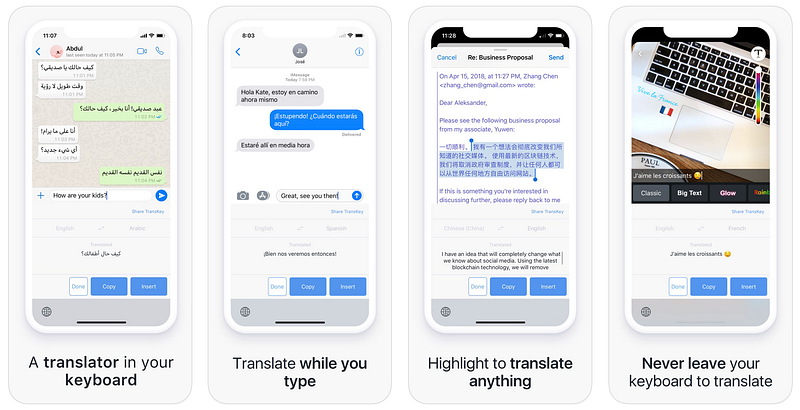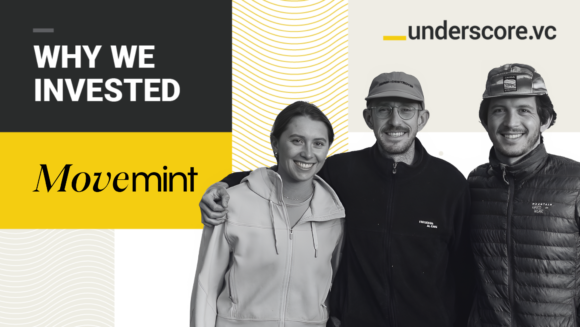This founder made a translation app for his Dad. Then thousands of people started using it.
Our new blog series, “Preparing for Lift-Off: 11 Founders Launching Bold New Startups,” features exclusive interviews with the founders from the latest cohort of our UFirst Summer Accelerator program. We’re sharing their stories and the daring ideas that are moving their companies forward. We’re excited to be working with them this summer, and hope you enjoy hearing about their journeys thus far and where they’re headed.
Up next: TransKey founder Aleksander Skjoelsvik. While most cross-language communication requires copying and pasting from a translation application to your chat conversation, TransKey enables that translation to occur within the chat itself — making that communication vastly more simple.

Originally from Norway, Aleksander conceived of TransKey to help his dad communicate more easily with tourists at his job. Turns out, a lot of other people wanted help speaking another language, too. What happened next launched Aleksander’s app, and Aleksander himself, into a whole new realm of business. Get the full story and find out how he’s now taking his app to the next level.
This is part 5 of 11 in our “Preparing for Lift-Off: 11 Founders Launching Bold New Startups” series created in partnership with growth marketing agency Ideometry. Tune in each week for another installment. Check out Part 4 with Steven Flanagan of Bountium.
Watch Transkey pitch at the 2019 UFirst Demo Day above!
Tell us a bit about TransKey.
Aleskander: TransKey is a mobile application that allows you to communicate with anyone in any language. It translates your texts, chats, or emails within whichever chat application you’re already using. Whether you’re using iMessage, WhatsApp, or any other channel, the application allows you to translate both the messages you’re sending out and the ones you’re receiving.
It enables smoother communications across language barriers instead of having to switch back and forth between a chat app and a translator app with copy and paste.
What sparked your interest in language translation?
Aleskander: A few years ago I saw the need within my own family. My father has a job in which he must often communicate with tourists and people who speak different languages. He was having a hard time switching back and forth between his email app and the translator app he was using. It made the entire communication flow a lot more of a chore than it needed to be.
This was in 2015, about a year after Apple’s Worldwide Development Conference where they announced they were adding a custom keyboard extension that developers could build on to be used within any iOS application. So it dawned on me that there should be a keyboard application that allows you to translate directly within the chat application of your choice, negating the need to switch back and forth.
I looked around the app store for something to share with my dad, but I came up empty-handed. I already had some iOS development experience, so I figured, why don’t I make it myself?
In about a week, I had the first version up and running. I shared it with my dad and a couple of friends. They loved it and started using it immediately. After a few more revisions, I launched a version on the app store in the fall of 2015. At the time, it was simply a small feature, something that could help my dad. So I left it at that, went back to studying in school, and continued developing a number of apps and games for fun.
At what point did you recognize that you had something you could build a business around, as opposed to just an interesting idea?
Aleksander: One day in the spring of 2017 — a year and a half after I’d finished the app — I started getting all these messages from users complaining that TransKey wasn’t working anymore. I took a look and realized I had exceeded the quota for translations that I can perform — which meant the app was doing over a million translations per month!
This came as a big surprise. I had created and shared the app with the expectation that nobody besides my dad and a few friends would use it. I quickly pushed out a fix and added some basic analytics to measure app activity. Suddenly, I started to see a business opportunity. I put my other projects on hold and decided to focus solely on TransKey.
By September 2017, I had about 50,000 daily active users and I was no longer able to support the app while keeping it free. That’s when I introduced monetization, converting the app into a freemium subscription-based model.
Over the next year, I continued updating the app while building up the growth marketing side. At this point, it had well over 250,000 users, and it’s still going strong today.

Where do you see the biggest need for this application?
Aleksander: There are a few markets where I already see a lot of use: business, tourism, education, and within families. In the business sector, there are lots of non-English speaking countries doing business with English-speaking countries — Saudi Arabia, for example. I see a lot of users download the app so they can communicate — through email, WhatsApp, you name it — with business partners or companies that only speak English.
Within tourism, when people visit another country, they’ll do things like book an AirBnB or call an Uber and start communicating in text, but without a way of doing it in the local language. They then use Transkey to communicate seamlessly with the locals and get around easier.
A hundred languages is a lot to keep track of. How do you manage translations in so many different languages?
Aleskander: That’s one of the aspects that makes this app so great for me as a solo project. I rely on third-party services to provide the translations themselves. I’m providing the interface that allows the user to act in a more efficient way than they were before. Essentially, I utilize translator applications such as the ones provided by Google, Microsoft, etc. and provide those services in a better package. This means that I don’t need to worry too much about the actual translations and gives me the opportunity to focus more on perfecting the keyboard extension.
What drew you to UFirst? What are you hoping to get out of it?
Aleksander: I see UFirst as a great opportunity to take things to the next level with Transkey. I’m looking forward to learning what it takes to run a company and to collaborate with all the great mentors that Underscore’s Core Community connects you with.
I work for a local startup in Boston called Arwen, an early-stage company that Underscore invested in and helped scale. Through this experience, I had the chance to witness last year’s UFirst accelerator and it seems like such a great opportunity to learn from mentors as well as other companies that are in the program. I’m looking forward to seeing how I can help and learn from the other startups and vice versa. I want to grow as an entrepreneur.
Being an entrepreneur, what are some of the biggest challenges you’ve faced along the way?
Aleksander: Ever since I was a kid, I’ve been passionate about making something from scratch and developing it myself. I used to get items at the grocery store and resell them to family members in my grandparents’ living room at a premium price. I’d recruit my cousin to write and perform plays for my family and neighbors, and we’d charge an entrance fee. I always wanted to be a business owner and my idol was Steve Jobs.
Growing up, almost everyone told me I wasn’t going to be able to become an entrepreneur. That has been the single hardest thing for me; to resist years and years of being told I can’t do this.

For TransKey in particular, I did not study business but rather computer science. So while I learned the technical skills through college, all the other stuff I’ve had to teach myself by reading books, watching tutorials online, and traveling all over the country to attend meet-ups and industry events.
What’s helped you overcome those challenges?
Aleksander: A lot of my motivation comes from watching other entrepreneurs succeed. I would watch YouTube videos of young entrepreneurs daily. I remember watching the movie The Social Network about how Facebook was started and thinking, ‘well, he did it and I can too.’ It is incredibly motivating to see other people who have put in the work and made it.
I also have a few relatives who are successful entrepreneurs in Norway that I greatly admire. I look up to them as they continue to build their business from scratch despite people telling them they couldn’t do it.
What’s the most valuable piece of advice you’ve received about being a founder?
Aleksander: Someone once told me that the difference between those who made it and those who didn’t is that the ones who didn’t gave up too early. To say it another way, you either make it or you die trying.

I’ve read and watched thousands of interviews of entrepreneurs who have made it. If there’s one common denominator, it is that none of them made it on their first try. They kept persisting and kept telling themselves you can do it. And, eventually, they did just that.
Tune in every Wednesday for the next ten weeks as we release new interviews from our “Preparing for Lift-Off: 11 Founders Launching Bold New Startups” series. Check out Part 4 with Steven Flanagan of Bountium.
Ideometry is a Boston-based full-service marketing agency serving a global client base. With a full suite of creative, development, and strategic services, Ideometry helps startups and Fortune 500 companies alike get the business results they’re looking for. If you’re doing something interesting, we’d love to hear from you. Get in touch with us at ideometry.com or email hello@ideometry.com








